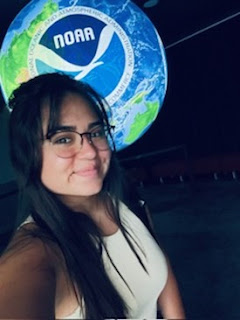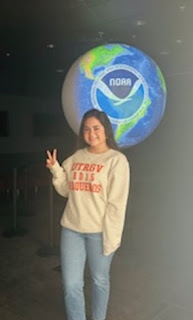 |
| Mya Brown, a master's student at the University of Texas Rio Grande Valley, recently completed her NERTO internship at the Pacific Island Fisheries Science Center (PIFSC) in Honolulu, Hawaii |
One of my research goals is to better understand if and how natural resource managers collaborate with the local communities they serve (e.g., hosting meetings and educational outreach events) and identify any conditions that help or hinder collaboration with community members to help improve current management strategies. This work involves local communities and looks to better address their concerns regarding coastal resource usage and economic development. Furthermore, my research stresses the necessity for collaborative networks between stakeholders and the environment. It also relates to an area of professional and personal interest to me -Equity and Environmental Justice or EEJ as it relates to environmental issues and my research is defined as having equitable input concerning the development, implementation, and enforcement of environmental laws, regulations, and policies. Environmental justice is a by-product of the civil rights movement and is linked to the unequal impacts and environmental decisions subjected to underserved, marginalized, and adversely affected communities in the United States. With this, NOAA Fisheries produced a National Equity and Environmental Justice Strategy to implement EEJ throughout the agency. For instance, the Pacific Island Region (PIR) has been working on implementing EEJ by establishing an EEJ working group with an interdisciplinary staff dedicated to incorporating it into their work. This integration will help guide NOAA staff to serve communities that are culturally and economically dependent on these coastal and oceanic resources.
My NERTO experience was very fulfilling as I had the opportunity to develop important intra-organizational reports, analyze PIR community feedback, and present my methods across the NMFS divisions. The data and other information I coded was incorporated into the PIR EEJ Implementation Plan Draft and highlights an essential step that NOAA is taking toward a more equitable future. Participating in this internship enabled me to improve my coding, analysis, reporting, and presenting skills regarding qualitative data. Additionally, the experience I had working with NOAA social scientists was a once-in-a-lifetime opportunity. Throughout my NERTO, I was supported by an amazing team of like-minded individuals who value understanding the greater impacts of NOAA work on communities. This work that I assisted with further cemented my passion for servicing underrepresented communities through science. This experience validated the importance of my thesis research in how it emphasized the importance of community-stakeholder dynamics and the effects that this has on resources.
My internship was made possible because of the fantastic leadership and support from the staff who guided me throughout my NERTO. I am grateful to the wonderful people I met at the PIFSC and the Pacific Island Regional Office (PIRO) who were actively involved in my work and offered guidance and opportunities for me to grow as a scientist. This experience has not only increased my love of science and serving the community it also served as a valuable learning experience on my journey to becoming a well-rounded scientist.
Accordingly, I was excited to have been provided an opportunity to complete a NOAA Experiential Research and Training Opportunity (NERTO) in the Fall of 2023 at the Pacific Island Fisheries Science Center (PIFSC) in Honolulu, Hawaii, where I served as a social science intern. I am incredibly grateful for this opportunity as it allowed me to experience engaging in social science research. My NERTO project involved working with the Pacific Island Region (PIR) Equity and Environmental Justice (EEJ) working group where I helped establish and facilitate intra-organizational workshops, record and code data collected during these events, and develop a comprehensive report summarizing the main topics and feedback workshop participants provided. The greater goal of generating these workshop reports was to help draft the PIR EEJ Implementation Plan, which I assisted in writing. Lastly, I aided in developing guiding documents and thematic codes that will be used across regions for other EEJ working groups.
 |
| Mya
Brown presented her NERTO research to NOAA scientists. |
 |
Mya Brown in front of the Pacific Island |
NOTE: Mya’s NERTO internship was made possible by the National Oceanic and Atmospheric Administration (NOAA) Office of Education, Educational Partnership Program with Minority-Serving Institutions award #NA21SEC4810004 (NOAA Center for Coastal and Marine Ecosystems-II). The contents of this post are solely the responsibility of the award recipient and do not necessarily represent the official views of the U.S. Department of Commerce, NOAA.





